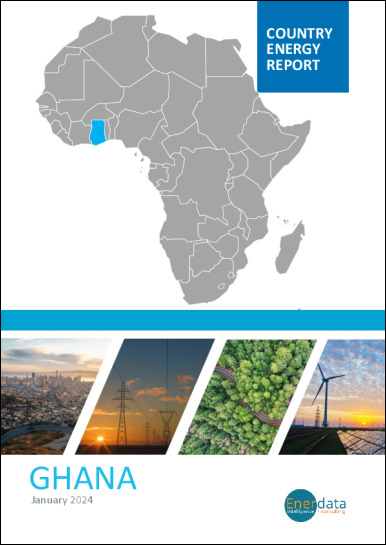- Update
-
- Format
- 3 files (PDF report, 2 Excel files)
- Pages
-
51 (Report only)
- Delivery
- Immediate by e-mail
- GENERAL OVERVIEW
- ENERGY AND CLIMATE POLICY FRAMEWORK
- ENERGY COMPANIES
- ENERGY SUPPLY AND DEMAND
- ENERGY USE AND PRICE BY SECTOR
- ISSUES AND PROSPECTS
- STATISTICS
- ABBREVIATIONS
- GLOSSARY
Buy Ghana energy report
Price without VAT. Depending on your statute and location, VAT might be applicable. Get in touch with us for more information.
After validation, you will immediately receive 3 files by email (one pdf report and 2 excel files containing the datasets).
Overview
Ghana is advancing its energy transition with ambitious climate and renewable targets, aiming for carbon neutrality by mid-century. The government oversees policy through key ministries, while state-owned and private entities drive electricity, oil, and gas sectors, prioritising gas-fired generation and expanding renewables.
Get more details on the table of contents and data files, as well as the list of graphs and tables by browsing the tabs below.
Highlights
- Ghana is seeking to develop 1.5 GW of wind and solar by 2030.
- The country targets carbon neutrality by 2060.
- The Volta River Authority, a state-owned utility, is the dominant power player with 50% of generation.
- Tullow operates two third of oil output, while it shares gas production with Eni.
- Gas production has tripled since 2018.
- Electricity generation is growing rapidly, increasingly based on gas (59% in 2024).
- Final energy consumption is increasing rapidly (5%/year since 2010).
- Transport is the main end-use sector (42% in 2024).
- The country aims to develop nuclear power projects.
Energy & Climate Policy Framework
The Ministry of Energy is responsible for the whole energy sector and replaced the former Petroleum and Power Ministries.
The Natural Resources, Environment and Climate Change (NREC) Unit, which is part of the Ministry of Finance, oversees the climate policy.
Energy Companies
Gas:
Tullow, accounted for 51% of the country's gas output, though the operation of the Jubilee and TEN fields (30% and 21%, respectively).
Eni operates the SGN fields which represented 49% of the gas production in 2024.
Energy Supply & Demand
Gas:
Gas production has tripled since 2018 and reached 3.5 bcm in 2024. Most of the production (66% in 2023) comes from the SGN fields, which started production in 2017 and have reserves estimated at 40 bcm.
Energy Use and Price by Sector
Energy Prices in Transport:
In 2015, the government authorised oil distributors to freely set pump prices. Previously, prices were regulated and subsidised. Gasoline and diesel prices in dollar terms tend to follow international oil prices; in 2024, they declined by 14% and 16%, respectively.
Graph: Energy Prices in Transport (Taxes Included)
Issues & Prospects
To meet its economic growth, the country is working on important projects aimed at the diversification of its energy supply through the development of the use of natural gas and the construction of power plants, while continuing to develop its hydroelectricity and oil resources.
- Graph 1: Primary Consumption Trends by Energy Source
- Graph 2: Total Consumption Market Share by Energy (2024)
- Graph 3: Installed Electric Capacity by Source
- Graph 4: Installed Electric Capacity by Source (2024)
- Graph 5: Gross Power Production by Source & Consumption
- Graph 6: Power Generation by Source (2024)
- Graph 7: Crude Oil Production & Consumption
- Graph 8: Petroleum Products Production & Consumption
- Graph 9: Gas Production & Consumption
- Graph 10: Emissions of GHG and CO2 from Fuel Combustion
- Graph 11: Final Demand Trends by Energy Source
- Graph 12: Final Consumption by Sector
- Graph 13: Final Consumption Market Share by Sector (2024)
- Graph 14: Final Consumption in Industry by Energy Source
- Graph 15: Energy Prices in Industry (Taxes Included)
- Graph 16: Final Consumption in Transport by Energy Source
- Graph 17: Energy Prices in Transport (Taxes Included)
- Graph 18: Final Consumption in Residential, Services, Agriculture by Energy Source
- Graph 19: Energy Prices in Residential (Taxes Included)
- Graph 20: Upcoming New Capacity by Energy Source
- Economic Indicators: Annual historical data including population, GDP growth, imports and exports, inflation rate, energy security and efficiency indicators, CO2 emissions.
- Supply Indicators: Historical data including oil and gas reserves, electric and refining capacity, energy production, power production and external trade. All are detailed by energy source.
- Demand Indicators: Historical data including consumption per inhabitant, consumption trends, total consumption by energy source, final consumption by energy source and sector, and electricity consumption by sector.
- Energy Balances: Single table displaying the overall energy industry balance per annum, also graphically displayed by energy sub-segment.
The Ghana energy market data since 1990 and up to
is included in the Excel file accompanying the Ghana country report.
It showcases the historical evolution, allowing users to easily work with the data.
Key Data included in the excelsheet:
- Economic indicators: Annual historical economic indicators, energy security, energy efficiency and CO2 emissions.
- Supply indicators: Annual historical reserves, capacity, production and external trade (imports(+) exports(-) balance).
- Demand indicators: Annual historical consumption per capita, consumption trends, total consumption, final consumption (per energy and per sector) and electricity consumption total and per sector.
- Energy Balance: total and per energy.
- Ghana Energy Prices: In addition to the analysis provided on the report we also provided a data set which includes historical details on the Ghana energy prices for the follow items: price of premium gasoline (taxes incl.), price of diesel (taxes incl.), price of electricity in industry (taxes incl.), price of electricity for households (taxes incl.), price of natural gas in industry (taxes incl.), prices of natural gas for households (taxes incl.), spot price of Brent and CO2 emissions (from fuel combustion).
 Energy and Climate Databases
Energy and Climate Databases Market Analysis
Market Analysis